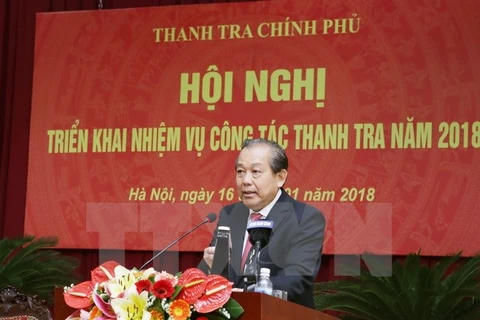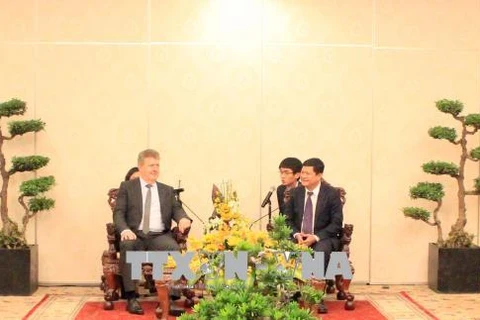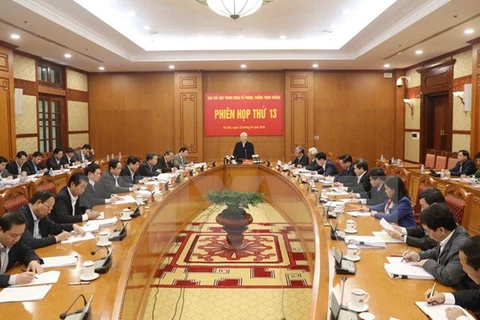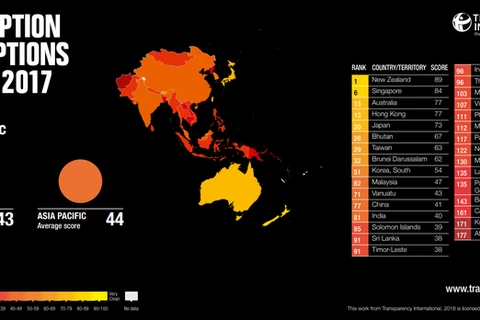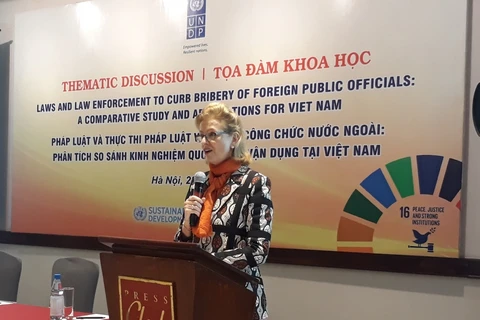 Representatives from the Ministry of Public Security, the United Nations Office on Drugs and Crime and the UK Embassy in Vietnam chair the training workshop.(Source: VNA)
Representatives from the Ministry of Public Security, the United Nations Office on Drugs and Crime and the UK Embassy in Vietnam chair the training workshop.(Source: VNA) Hanoi (VNA) - A training workshop to improve the capacity of anti-corruption and law enforcement agencies in the use of techniques and tactics to investigate corruption cases was launched in Hanoi on March 14.
The three-day event was held by the United Nations Office on Drugs and Crime (UNODC) in collaboration with the Ministry of Public Security.
The workshop attracted more than 50 participants from corruption prevention agencies, law enforcement agencies, and investigating bodies of Cambodia, Laos, Myanmar, Thailand and Vietnam.
The training workshop will cover a wide range of investigative skills for corruption cases, ranging from the gathering of evidence and documentation to witness interviews, electronic surveillance and the use of scouts.
It will also introduce indirect methods to demonstrate the origin of corrupt behaviour and good practices in investigating corruption.
An important objective of the workshop is to strengthen the capacity of law enforcement agencies to file and submit requests for judicial assistance to the central offices of other countries to gather evidence.
Speaking at the workshop, senior lieutenant-colonel Le DucTuyen, deputy director of the Foreign Affairs Department under the Ministry of Public Security, said that during the past years, crimes related to corruption and money laundering had increased triggering losses, threatening stability and development in all sectors, including economy, society, politics and national security.
Statistics provided by the World Bank has shown that the world lost some 1 trillion USD annually because of money laundering, he said.
“Cooperation in preventing money laundering and corruption is necessary and indispensable,” said Tuyen.
Vietnam is striving to prevent corruption, but still faces obstacles and needs closer cooperation with other countries in the area, especially in the great Mekong region, and international agencies, including the UNODC.
“Together by completing the legal framework, Vietnam can better implement its international role in corruption prevention,” said Tuyen.
Attending the workshop, Francesco Checchi, an anti-corruption adviser from the UNODC, said that corruption has been recognised as a threat to national security, and social and economic development globally.
It negatively affects public service delivery, such as access to health care and education, as well as to justice, he said.
Cambodia, Laos, Myanmar, Thailand and Vietnam share common or close border, and so criminals and proceeds of crime often travel across borders throughout the region.
“Regional coordination and cooperation is essential for the detection and successful prosecution of corruption and money laundering, as well as for the recovery of stolen assets,” he said.
“I really hope that this event will help the development of mutual understanding and enhance cooperation for addressing corruption in the Mekong region, with the ultimate goal of making the region a safer, wealthier and more just place,” he said.-VNA
VNA
